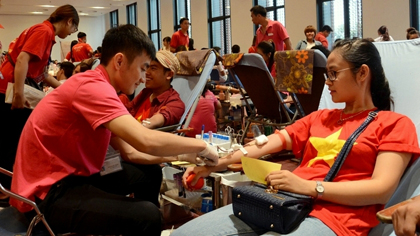Blood donation campaign collects 24,000 blood units
The National Institute of Hematology and Blood Transfusion in collaboration with Hanoi blood donation agencies successfully held the Pink Drop Festival on July 31 to sum up the trans-national blood donation campaign, namely the 2016 Red Journey.
 |
| Donors giving blood at the Pink Drop Festival held at the Vietnam National Convention Centre in Hanoi on July 31. (Credit: NDO) |
Red Journey under the theme ‘Connecting Vietnamese bloodstream’ was held from July 1-31 with various activities including promotional programmes to encourage giving blood, organising blood donation drives and raising public awareness on congenital hemolytic anemia.
A team of 130 volunteers have been on a 3,000 km journey to provide more than 500,000 locals with information on congenital hemolytic anemia and encourage them to donate blood to help patients in need.
During the journey, 27 blood donation festivals were organised in 27 major provinces and cities, attracting the participation of tens of thousands of locals. The organisers received more than 24,000 units of blood during the one-month campaign, helping to ensure blood supply for emergency treatment in the summer and ease blood shortages on a national scale.
Red Journey has demonstrated that it is a unique and effective volunteering model in the mobilisation of voluntary blood donation to connect people in kindness and responsibility for community activities.
Speaking at the sum-up event, Politburo member and head of the Party Central Committee's Commission for Mass Mobilisation Truong Thi Mai applauded the success of Red Journey 2016 and said that the journey has evoked the spirit of kindness and sharing and spread it within the community to bring hope to millions of patients in need throughout the country.
She stressed that Vietnam has reached the middle-income country status but there are still a range of challenges that need the joint efforts from the whole society to resolve, such as the risks of those living below the minimum income threshold and the risks of old age, illness, loss of employment, natural disasters, and epidemics.
She called for the development of appropriate policies to reduce risks facing the people, encouraging the whole society to join social security policies and charity activities, including voluntary blood donations, to maintain and promote the nation's fine, ethical and deep-rooted traditions.
Politburo member Mai also expressed her hope that more and more young people would join blood donation campaigns as volunteers and the campaigns would receive increasing support from the community.
(Source: NDO)
 về đầu trang
về đầu trang







